by David Vidorreta.
Transforming knowledge into GDP. Summarized in these four words is Tecnalia Research & Innovation´s reason for being. Without getting lost in grandiloquent speeches about the importance of research and innovation for the betterment of society, this simple slogan reflects the reality of what technological innovation is (or what it should be): the use of knowledge to create new business opportunities that generate wealth. And from that wealth, society as a whole, can in turn benefit.
Tecnalia R&D is a tangible example of the old aphorism “union is strength”. It was founded in 2010 by Labein, Inasmet, and Robotiker, three centers with a long track record and experience in the field of research. Later, the research centers of Fatronik, Cidemco, ESI, Leia and Euve were added. The union of these eight partners has resulted in this technological giant, which has become the largest private group of R+D+I in Spain and one of the first in Europe. Currently, Tecnalia is ranked 20th in the European Research Ranking, out of more than 20,000 organizations that participate in the Seventh Framework Programme of the EU.
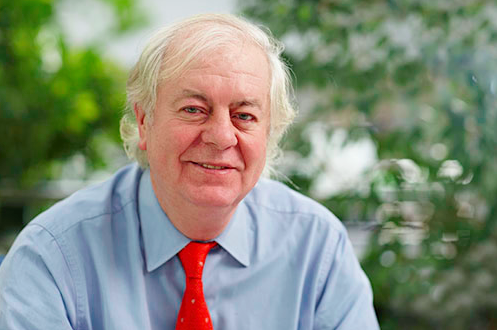
Joseba Jauregizar, General Director of TECNALIA
Taking a look at its numbers helps to better appreciate its magnitude. Tecnalia has a staff of 1,500 highly qualified people dispersed across its numerous branches and offices all over the world. It has a portfolio of more than 4,000 customers, and its sales last year reached 110 million euros. As a result, this commitment to research has produced 114 patents and 25 new technology-based companies, emerging from the innovations developed at its centers. Since 2007, this Center has contracted 359 projects, of which it leads more than 21%, well ahead of the 11% average in Spain.
In addition, together with the Center for Food and Marine Research AZTI-Tecnalia and the Neiker-Tecnalia Basque Institute of Research and Agricultural Development, Research & Innovation is part of the Tecnalia Corporation, a strategic alliance that brings together as much as 64% of the Basque technology network and 25% across Spain. In other words, one of every four technology centers that exist in Spain belong to this Corporation, which gives us an idea of its size and the relevant position of research in the Basque Country.
This huge diversification of areas in which Tecnalia works has resulted in innovations springing from its research and are present in virtually all sectors of the economy such as construction, energy, environment, the food industry, transportation or health.
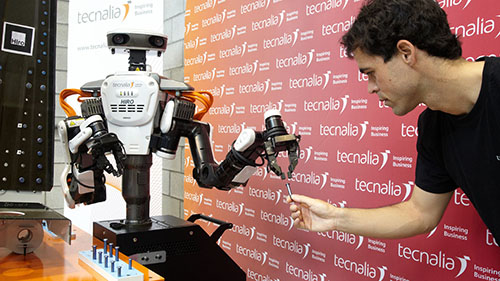
HIRO, the collaborative robot
Europe is Looking at the Basque Country
This intense research activity has turned Tecnalia into one of the most relevant of the continent in R+D+I, as shown by its participation in dozens of European projects, contributing its knowledge and developing innovative solutions, applicable on an industrial scale and ready to be launched in the market.
Internationalization is one of its priorities. According to Joseba Jauregizar, General Director of Tecnalia, “We know very well that international expansion is a challenge for our customers, and therefore it is a challenge for us. We want to assist companies in priority international markets for them and be a propeller of internationalization for less global companies.”
Therefore the Technology Center has an extensive network of allies and international relationships. Collaboration in a format of open innovation with the best in their fields of specialization (regardless of their geographical location) is essential to achieving two objectives: on the one hand, to exercise a function of “technological antenna”, identifying the best ideas which revert later to competitive improvement of businesses. And on the other, to help companies in their internationalization process, with more competitive products and services in a globalized competitive setting.
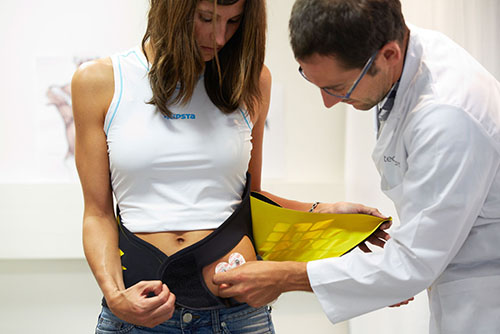
LUMBIA, technology for lower back problems
Taking on the Crisis with More R+D+I
We know that research has been hit hard by cuts as a result of the economic crisis despite the almost unanimous opinion that research and innovation are precisely the most effective tools to exit a recession and incidentally to strengthen us against future adverse conditions.
Facing this situation, Tecnalia’s formula leads it to reinforce its commitment to R+D+I and the transfer of technology to industrial fabric. “Clearly we’re feeling the effects of this crisis that is still hitting companies very hard,” admits Joseba Jauregizar. And precisely because the situation we are faced with is so complicated, our efforts must focus on being more efficient, closer to their needs, offering them more technological added value at a competitive cost and sharing risks”. In short, innovation and technology are presented as “the only positive way out of the current situation.”
But how is the research activity of Tecnalia reflected in the Basque economy? No doubt, in the ruthless global market, companies are required to become more competitive. There is no other formula. And to do this they need higher value-added technology, more efficient processes and an innovative business model. “We believe that in the current situation it would be a mistake not to bet on innovation, giving companies a cost-effective and differential and profitable positioning,” argues Jauregizar. “What we want from Tecnalia is to be the technology partner that is ideal for any type of company, especially for medium sized and small businesses. That is our role in the Basque economy,” he concludes.
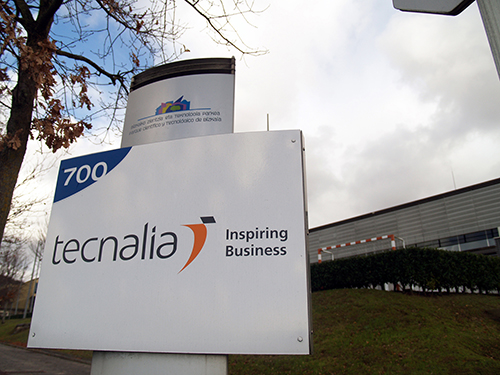
TECNALIA offices in Zamudio (Bizkaia)
Featured Projects
This commitment to innovation and applied research, with a view for the creation of new business opportunities generating from GDP and employment, has produced results that can be applied to many sectors. Thus, in the field of industry, the collaborative robot HIRO stands out, a humanoid working side by side with people, improving worker capacities and increasing the competitiveness of production processes. Tecnalia won an award for this project last year at the European Manufacturing Awards, held each year in Düsseldorf (Germany) to choose the best developments in the field of manufacturing across Europe.
In the field of sustainable transport, intelligent systems and electric vehicles, Tecnalia has achieved important advances in wireless recharging vehicles. And without leaving the environmental field, it is worth noting its commitment with “Ecomaterials”, by Osirys. These innovative materials will improve the quality of air inside buildings, as well as their thermal and acoustic insulation.
On another note, facing the challenge posed by population ageing, notably one of the most recent initiatives of the Research Center is LUMBIA, a technology to prevent and repair problems in the lumbar area, undoubtedly one of the most common ailments as a result of our current lifestyles.
These are just some examples of the various developments and fields in which Tecnalia is working, but as mentioned earlier, its activity is present in many other sectors, with companies that have greatly improved their competitiveness through technological innovation.
As for the future, Tecnalia is proud to have become an example of the inherent optimism in the DNA of the researcher, and its work will continue in the setting of the many global challenges that society faces every day. As Joseba Jauregizar explains, “Our goal is to continue creating knowledge and ideas that will help companies to be different, making them more competitive through innovation. Transforming knowledge into wealth and jobs and into well-being for society: that is why we were born and why we are necessary.”
 |
David Vidorreta is a Journalist and Editor at http://www.residuosprofesional.com |
| @davidorreta | |




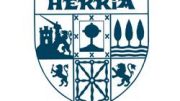

It’s good to see news like this